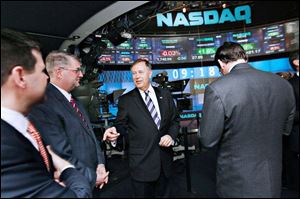
Ex-Rep. Oxley joins Nasdaq
3/16/2007
Michael Oxley, at the exchange yesterday, will represent the company on public policy issues.
NEW YORK - Nasdaq Stock Market Inc., the second-largest U.S. equity exchange, named former U.S. Rep. Michael Oxley its non-executive vice chairman to represent the company's views on public policy issues.
Mr. Oxley, a Republican from Findlay and co-author of the Sarbanes-Oxley Act, which toughened corporate accounting rules, will join the exchange immediately, Nasdaq said.
In the newly created position, he will report to Chief Executive Robert Greifeld.
Nasdaq failed last year to win control of London Stock Exchange PLC amid concerns from some investors that European companies would have to comply with provisions of Sarbanes-Oxley.
The company now faces increased competition as larger rival NYSE Group Inc. pushes into Europe and Asia and smaller electronic markets lure business away with lower fees.
Mr. Oxley may help foreign exchanges that are potential Nasdaq merger partners "feel more comfortable about U.S. regulation," said Josh Elving, an analyst at Piper Jaffray Cos. of Minneapolis. Mr. Oxley's hiring "adds credibility to management," the analyst said.
Nasdaq said its market share of trading in its listed stocks fell to its lowest in at least two years and failed to make inroads in trading NYSE-listed stocks for the first time since December, 2005. In February, Nasdaq's market share of the total number of stocks listed in the United States slipped to 27.2 percent from 27.7 percent a month earlier, according to data on its Web site.
Mr. Oxley said he will work with Nasdaq and its listed companies to form a policy agenda.
He joined the Washington office of the law firm Baker & Hostetler LLP on Monday and will maintain an office in New York, the company said.
Mr. Oxley, 63, retired from Congress after deciding not to run for re-election last year. He led the House Financial Services Committee, which oversaw banks, mutual funds, financial markets, and the U.S. Securities and Exchange Commission. He was first elected to Congress in 1981.